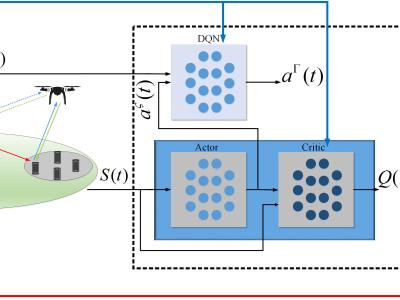Mobility-Aware Robust Resource Allocation and Computation Migration in Heterogeneous Virtualized Vehicular Networks by Low Overhead Multi-Agent DRL-based Approach

- Citation Author(s):
-
Mohsen PourghasemianMohammad Reza AbediNader MokariMohammad Reza JavanEduard A. Jorswieck
- Submitted by:
- Mohsen Pourghasemian
- Last updated:
- DOI:
- 10.21227/pemn-g388
 467 views
467 views
- Categories:
- Keywords:
Abstract
In emerging vehicular networks, delay-sensitive tasks can be processed in real time by offloading to
the edge computing servers. Unlike the legacy scenarios, in this paper a novel data offloading/delivery
decision making framework is proposed, where users have the option to divide their task into several
portions and partially offload their data to a complex multi-access edge computing (MEC) environment,
consisting of several MEC servers located on road side units (RSUs), base stations (BSs), and unused
computing power in other vehicles and pedestrians. This can increase the reliability and the spectral
efficiency, and decrease delay. However, due to high mobility of vehicles, the vehicle-mounted MEC
servers act as a uncertain payoff for the users, while the local computation server (e.g., RSUs, and BSs)
alternatives constitute safe and guaranteed options. Therefore, the offloaded tasks may be migrated to
other MEC servers to provide continuous execution. In addition, users’ high mobility and traffic variation
can result in task offloading demand uncertainty and the imperfect channel state information (I-CSI)
estimation that lead to difficulties in guaranteeing the quality of service (QoS) for each task. In this
paper, we consider a two-time scale resource management scheme for task offloading with fluctuated
traffic demands and I-CSI, aiming at minimizing total network cost and delay. We consider a hierarchical
control architecture in our proposed scheme including large time-scale RSU activation/deactivation and
short time-scale resource allocation, and making task offloading decisions. We extend our problem as
multi-time scale Markov decision process. Simulation results validate that our proposed task offloading
scheme can increase the task completion rate by 27% and 98% when considering task partitioning and
task migration, respectively. Moreover, considering demand uncertainty, we can achieve more robust
solution by increasing the task completion rate by 42.8%. Finally, we show that considering MADDPG
can increase task offloading cost by 45% due to communication overhead between agents.
Instructions:
Requirements:
Tensorflow >= 1.15
Keras >= 2.4
Python >= 3.7
After running the "run.py" file, the rewards.txt is created. Simply plot the reward.









